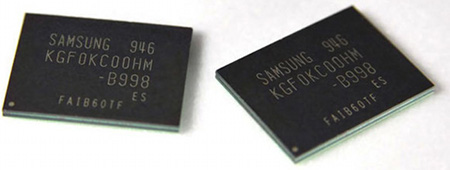Flash memory makers team up for content protection scheme
Dec 19, 2011 — by LinuxDevices Staff — from the LinuxDevices Archive — viewsPanasonic, Samsung, Sandisk, Sony, and Toshiba announced they'll collaborate on a content-protection scheme targeting SD cards and other flash memory devices. The “Next Generation Secure Memory Initiative” will involve PKI (public key infrastructure) and will be robust enough to protect HD video content, according to the companies.
On Dec. 19, Panasonic, Samsung, Sandisk, Sony, and Toshiba said they have "reached an agreement in principle" to collaborate on a new content protection technology for SD cards and other flash memory-based storage devices. The Next Generation Secure Memory Initiative will provide content protection for HD video "in advanced consumer applications such as tablets and smartphones," according to the companies.

64GB flash chips from Samsung, one of the Next Generation Secure Memory Initiative partners
Like other copy protection schemes, the Next Generation Secure Memory Initiative — which will gain a more catchy name later — may be more of an annoyance to consumers than a benefit. However, the partners promise, it will enable "various HD content applications such as HD network download, broadcast content to go, and HD digital copy/managed copy from Blu-ray disc media."
According to the companies, their new content protection scheme will let users enjoy HD content on a wide range of devices, "including Android-based smartphones and tablets, TVs, and Blu-ray products." No mention was made of any Microsoft Windows devices, however, and it would appear the partners tacitly expect Apple — whose ecosystem does not support Blu-ray drives in any case — to keep going its own way.
No information was provided on how the Next Generation Secure Memory Initiative will work, but it apparently will involve modifications to flash memory. "A high level of content security will be realized through the use of the initiative's technologies, including unique ID (identification) technology for flash memory and robust copy protection based on public key infrastructure," the companies stated.
Further information
According to Panasonic, Samsung, Sandisk, Sony, and Toshiba, their new secure memory technology will be licensable early in 2012, and products based on it should start coming onto the market later in the year. More information may eventually appear on the Next Generation Secure Memory website.
Jonathan Angel can be reached at [email protected] and followed at www.twitter.com/gadgetsense.
This article was originally published on LinuxDevices.com and has been donated to the open source community by QuinStreet Inc. Please visit LinuxToday.com for up-to-date news and articles about Linux and open source.